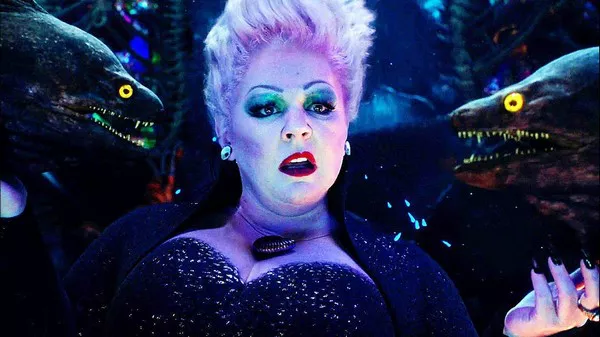In the vast realm of Disney villains, one character stands out for her wickedness and cunning nature – Ursula. The iconic antagonist from Disney’s “The Little Mermaid” has captivated audiences with her devious schemes and imposing presence. But what exactly makes Ursula evil? In this article, we will delve into the depths of Ursula’s character, examining her motivations, actions, and the profound impact she has had on the Disney villain pantheon.
I. The Makings of a Malevolent Sea Witch
-
Ursula’s Origins:
Ursula, also known as Ursula the Sea Witch, is a character inspired by the sea witch from Hans Christian Andersen’s fairytale “The Little Mermaid.” In Disney’s adaptation, Ursula possesses a striking appearance, with her ominous tentacles and commanding presence. Her character design itself sets the stage for her malevolence, visually emphasizing her role as the primary antagonist.
II. Motivations Born from Envy and Power
-
Envy and Resentment:
Ursula’s evil nature stems from her deep-seated envy towards her brother, King Triton, ruler of the sea. Feeling overlooked and underappreciated, she seeks to seize power and take control of the underwater kingdom. Ursula’s thirst for power becomes the driving force behind her malevolent actions, as she resorts to cunning manipulation and deception to achieve her goals.
III. A Master Manipulator
-
Scheming and Manipulation:
Ursula possesses a keen intellect and manipulative prowess, making her a formidable adversary. She preys on the vulnerabilities and desires of others, using her magical abilities to strike dark deals. Ursula’s most infamous act of manipulation is seen when she strikes a Faustian bargain with Ariel, the film’s protagonist, offering to grant her wish to become human in exchange for her voice. This act showcases Ursula’s ability to exploit others for her personal gain, highlighting her sinister nature.
IV. The Temptress of Desires
-
Deceptive Allure:
One of Ursula’s defining traits is her ability to entice and tempt her victims. With her captivating voice, she lures unsuspecting souls into her web of deceit, promising to fulfill their deepest desires. Ursula preys on the insecurities and aspirations of those who come seeking her assistance, ultimately using their own desires against them. This manipulation further solidifies her status as a truly wicked character.
V. Rule Through Fear and Tyranny
-
Underwater Domination:
Ursula’s ultimate goal is not just to gain power but to dominate the underwater kingdom, ruling with an iron fist. Through her enchanting spells and relentless pursuit of control, she instills fear and subjugation in the hearts of her subjects. Her reign is marked by oppressive rule and the suppression of individuality, painting a bleak picture of her true intentions.
VI. Lessons Learned: Ursula’s Impact
-
The Dark Appeal:
Despite Ursula’s wickedness, she has become an iconic character, resonating with audiences of all ages. Her striking appearance, memorable voice, and villainous demeanor have made her a fan-favorite. Ursula’s popularity can be attributed to her role as a cautionary figure, teaching valuable life lessons such as the dangers of selfishness, manipulation, and the pursuit of power at any cost.
Conclusion:
Ursula’s evil nature is a culmination of her envy, manipulative tendencies, and insatiable thirst for power. Through her devious actions and cunning schemes, she solidifies her position as one of Disney’s most iconic villains. Ursula’s impact transcends her role in “The Little Mermaid,” serving as a reminder of the dangers of unchecked ambition and the consequences of succumbing to one’s darkest desires.
Ursula’s character serves as a cautionary tale, reminding us of the importance of integrity, empathy, and the perils of being swayed by promises that seem too good to be true. Her allure and charm are deceptive, concealing her true intentions beneath a facade of enchantment. She embodies the treacherous path one can embark upon when driven by envy, resentment, and an insatiable hunger for power.
Moreover, Ursula’s portrayal as a female villain holds significant meaning. She challenges traditional gender roles by asserting herself as a formidable antagonist who manipulates and schemes with intelligence and agency. Her character breaks away from the archetype of the passive female antagonist and presents a dynamic and complex portrayal of evil.
Ursula’s wickedness has left an indelible mark on popular culture. From her iconic musical number “Poor Unfortunate Souls” to her menacing presence and distinctive voice, she has become an enduring symbol of Disney villainy. Her impact extends beyond the realm of “The Little Mermaid,” with Ursula being celebrated in various forms of media, merchandise, and even adaptations in other entertainment mediums.
Through Ursula’s malevolence, we are reminded of the importance of compassion, honesty, and the dangers of succumbing to one’s darkest desires. Her character serves as a reminder that true power lies not in manipulation and tyranny, but in empathy and understanding. It is through the actions of virtuous heroes, like Ariel, that the forces of evil can be ultimately overcome.
In conclusion, Ursula’s evil nature stems from her envy, manipulation, and insatiable hunger for power. Her character embodies the dangers of unchecked ambition and serves as a cautionary figure. With her compelling presence and villainous allure, Ursula has secured her place as one of Disney’s most memorable villains. As we continue to be enthralled by her wickedness, let us also reflect on the valuable lessons she imparts, reminding us of the importance of integrity, empathy, and the consequences of succumbing to our darkest desires.

